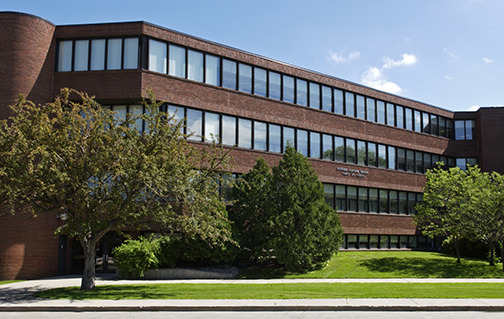
Social Science Education
This is an archived copy of the 2021-22 catalog. To access the most recent version of the catalog, please visit https://catalog.ndsu.edu.
Social science involves the study of people and their interactions with each other, with their social and political institutions and with their environments. Accordingly, the social science education major includes a broad range of courses and subjects. Teacher candidates are expected to demonstrate both breadth and depth of understanding in the academic disciplines that make up the social sciences.
The Program
Candidates in the social science education major are prepared to teach a diverse curriculum to a diverse student population. The social science education teacher candidate should work closely with an advisor to be sure that the general education courses taken will provide a strong foundation for the advanced courses in the major.
Professional Education Courses
Teacher candidates may enroll in the 300-level professional education courses before being formally admitted to the School of Education (SOE). Prior to enrolling in the 400-level courses, teacher candidates must complete the application for admission to the SOE; attain a minimum of a 2.75 grade point average overall in their course work and education courses; and pass the Praxis Core Academic Skills for Educators exam or meet minimum scores on the ACT+. Requirements for admission can be found on the School of Education website.
Student Teaching
Student teaching (clinical practice) is the culmination of the teaching program. During the clinical practice, teacher candidates apply the knowledge and skills acquired in their college courses to real-world classrooms under the supervision of experienced social science teachers in middle or high schools. Faculty members from NDSU conduct regular on-site visits to support, encourage, and evaluate teacher candidates so that they gain the confidence and ability to join the teaching profession after graduation.
Student Advisement
An academic advisor works individually with social science education majors to plan their programs of study and to advise and assist them as they progress to degree completion. Students are encouraged to seek their advisor's help whenever needed. Appointments with advisors can be scheduled through the Navigate online system found on the Student Affairs web page, https://www.ndsu.edu/enrollmentmanagement/studentsuccess/
LICENSURE
Upon completing this program, teacher candidates are eligible for teacher licensure in social science in most states. Our program is accredited by the Council for the Accreditation of Educator Preparation (CAEP) and approved by the North Dakota Education Standards and Practices Board (ESPB).
Career Opportunities
There has been a surplus of social science teachers across the country for the past several years. It has been predicted that the surplus will continue. Students who elect to major in social science education should consider obtaining a second major or a teachable minor to enhance their employment prospects. In addition, students in social science education are encouraged to seek volunteer and employment experiences that complement their education. Summer or after-school work with special needs students, high school or middle school student activities, or other human service activities can provide the candidate valuable experience with children and adolescents.
Sample Program Guide
Please note this is a sample program guide and not an official curriculum. Actual student schedules for each semester will vary depending on start year, education goals, applicable transfer credit, and course availability. Once admitted, students are encouraged to work with their assigned academic advisor on a regular basis to review degree progress.
| First Year | |||
|---|---|---|---|
| Fall | Credits | Spring | Credits |
| COMM 110 | 3 | ENGL 120 | 3 |
| ENGL 110 | 3 | GEOL 106 | 3 |
| HIST 101 | 3 | GEOL 106L | 1 |
| Science & Technology | 3 | HIST 102 | 3 |
| Social & Behavioral Sciences | 3 | Quantitative Reasoning | 3 |
| Wellness | 2-3 | HIST Diversity & Inclusion in History | 3 |
| 17-18 | 16 | ||
| Second Year | |||
| Fall | Credits | Spring | Credits |
| EDUC 321 | 3 | EDUC 322 | 3 |
| HIST 103 | 3 | HIST 104 | 3 |
| GEOG/ECON/POLS Elective | 3 | GEOG/ECON/POLS Elective | 3 |
| HIST European History | 3 | HIST Widening Horizons | 3 |
| Science & Technology | 3 | HIST European History | 3 |
| Complete Core Academic Skills Exam or access your ACT+ scores | Apply to the School of Education | ||
| 15 | 15 | ||
| Third Year | |||
| Fall | Credits | Spring | Credits |
| EDUC 451 | 3 | EDUC 489 | 3 |
| GEOG/ECON/POLS Elective | 3 | GEOG/ECON/POLS Elective | 3 |
| ECON 201, POLS 115, or GEOG 151 | 3 | GEOG/ECON/POLS Elective | 3 |
| HIST Widening Horizons | 3 | HIST US 300-400 Elective | 3 |
| HIST US 300-400 Elective | 3 | Science and Technology | 3-4 |
| 15 | 15-16 | ||
| Fourth Year | |||
| Fall | Credits | Spring | Credits |
| EDUC 481 (Social Sciences) | 3 | EDUC 485 | 1 |
| EDUC 486 | 3 | EDUC 487 | 9 |
| HIST 390 | 3 | EDUC 488 | 3 |
| GEOG/ECON/POLS Elective | 3 | ||
| GEOG/ECON/POLS Elective | 3 | ||
| Apply for Student Teaching | |||
| Complete PLT (grades 7-12) Exam | |||
| Complete Subject Area Assessment Exam | |||
| 15 | 13 | ||
| Total Credits: 121-123 | |||
